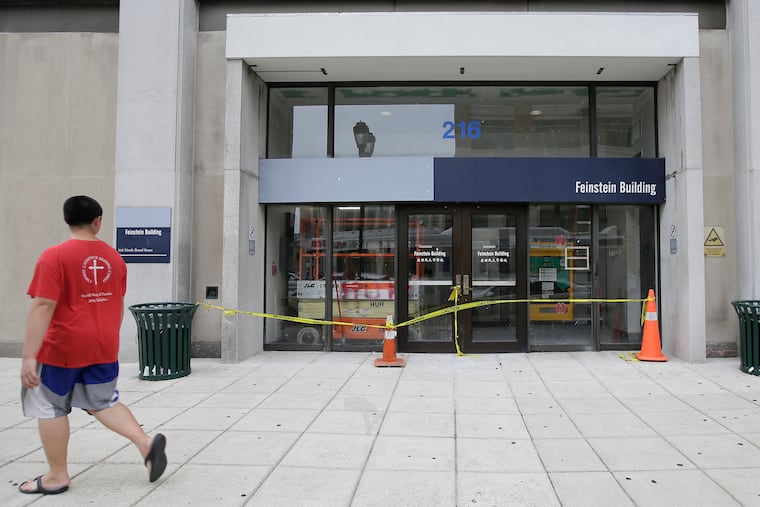Philadelphia plans to use part of the former Hahnemann hospital as a shelter space
The former hospital has been vacant since Hahnemann closed in 2019. Its new use comes as Mayor Parker's administration has prioritized getting the homeless population off the streets and into shelter.

Mayor Cherelle L. Parker’s administration is seeking to establish an emergency shelter inside an office building that was formerly part of Hahnemann University Hospital on North Broad Street, putting to use a part of the defunct complex that’s been vacant for years.
The city recently finalized a lease with the building’s owner and is looking to renovate it into a shelter for people who are temporarily displaced as a result of a fire, natural disaster, or other emergency, according to Managing Director Adam K. Thiel.
He said the city’s current stock of shelter beds — especially those that are available to families — is inadequate.
“All too frequently we have folks burned out of their homes in fires and daily disasters,” said Thiel, the former fire commissioner, “and we need a place to take care of them.”
The city’s lease and impending renovation represents a significant reuse of the five-story, 45,000-square-foot office annex at 216 N. Broad St., the Feinstein Building, which sits at a busy Center City intersection just north of City Hall and had previously been leased to Drexel University as lab space.
Thiel said he couldn’t estimate a timeline for construction or the number of beds the renovated shelter would hold.
Hahnemann declared bankruptcy and shut its doors in 2019, just two years after it was acquired by private equity firm Paladin Healthcare Capital. Separately, development firm Iron Stone Real Estate Partners bought the Feinstein Building as part of a portfolio of former Hahnemann properties in 2021. Bankruptcy proceedings related to the two main hospital towers are ongoing.
Iron Stone initially sought to market the space in the Feinstein Building for medical or “social service” offices, but last year, it was rezoned for “group living,” city records show. In December, City Council passed legislation approving the city enter a 15-year lease at a base rent of about $940,000 annually.
» READ MORE: How Philly’s Office of Homeless Services overspent $15 million: ‘Things got away from everybody’
Last month, the city finalized its lease agreement with Iron Stone, and two weeks ago, a construction permit was issued to convert the entire space into a “boarding house.” A representative for Iron Stone didn’t respond to a request for comment.
The arrangement was set in motion under former Mayor Jim Kenney’s administration and predates Parker’s term, which began in January.
But news that the lease was finalized comes as her administration has prioritized the city’s homeless population and sought to get people off the streets, out of public spaces, and into shelter.
Earlier this month, Philadelphia Police and city outreach workers cleared out an unspecified number of people who were living at Philadelphia International Airport amid a broader effort to rid the airport of encampments.
And Parker’s administration is developing a plan to move people away from living on the street in the city’s Kensington neighborhood, where an open-air drug market has fueled years of homelessness and sprawling encampments.
It’s not clear whether the renovated space on North Broad Street could be used to house the city’s broader homeless population. Thiel characterized the plan as a work in progress.
A network of more than three dozen shelters serve Philadelphia’s homeless population. According to a 2022 report released by the Office of Homeless Services, there were 3,667 emergency shelter beds and hundreds more beds in other forms of temporary housing. At the same time, there were about 3,700 people in some form of temporary shelter that year, and the number of unsheltered people was about 800.
But some advocates have disputed the city’s figures, saying the Office of Homeless Services has undercounted the number of people living on the streets — particularly in Kensington — and has an inadequate stock of shelter beds. In addition, the city has over the last several years seen an influx of asylum seekers, many of whom have temporarily stayed at a shelter in Kensington.
Thiel said the system has been further stressed because a shelter that houses families caught fire late last year. He said the Office of Emergency Management, of which he was formerly the director, frequently refers people who are affected by unforeseen disasters to the Red Cross. The nonprofit operates a shelter space in the city that Thiel said is often full.
“We are looking at all types of options to make sure — as you’ve heard the mayor say over and over — that we take care of people across the city,” he said. “This gives us another option.”
Staff writer Harold Brubaker contributed to this article.